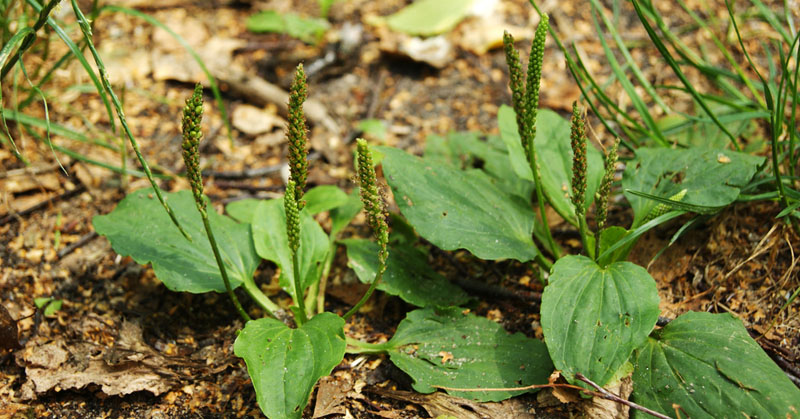Before you pull out that weed, look again. It might be a plantain, one of the most useful herbs on the planet!
Plantain herbs have been around for centuries, and they grow on almost every continent. There are two genera, or types, that offer the most beneficial health properties: Plantago major and Plantago lanceolata. Plantago major is shorter with rounder leaves, while Plantago lanceolata have a more pointed, narrow leaf. Both offer the same natural ingredients. In fact, all of a plantain’s parts can be made into a curative. Even the soft, spiny tops!
Plantain herbs are rich in Vitamin A, C, and K, Potassium, Calcium, Sodium, Phosphorous, Copper, Zinc, Magnesium, and fiber.
Use them to improve the following conditions:
- Kidney and Liver Function: Drink one to two cups of plantain tea (recipe here) daily.
- Burns: Apply the poultice (recipe here) to the burned area and cover with a bandage. Follow up with a homemade plantain salve.
- Sunburns: Apply the tea to cool your burn and relieve the pain, then add a salve.
- Acne: Add a drop of plantain tincture (recipe here) into your regular washing regime. Use the salve as an all-organic paraben-free moisturizer.
- Poison Ivy/Oak: Apply the poultice and then wash with the tea.
- Throat Infections: Gargle with the tea or diluted tincture.
- Snake Bites: Immediately apply the tincture. Re-apply liberally.
- Cold, Flu and Respiratory Infections: Place two drops of tincture under the tongue and drink plantain tea with organic lemon and raw honey.
- Dandruff: Add the tea into your washing routine and massage scalp with a plantain salve.
PLANTAIN TEA:
- Plantain Leaves
- 3-5 Cups of Water
Take a small handful of clean leaves and place them in a heat safe container with a lid. Pour 3-5 cups of boiling water over the leaves and let them sit until the tea is cool. You can store extra tea in the refrigerator for up to 2 weeks.
Plantain herbal tea is beneficial for strong liver and kidneys. It helps control Irritable Bowel Syndrome, prevent stomach ulcers, alleviate diarrhea, and treat inflammations in the gastrointestinal tract. It’s also extremely high in Vitamin A and C. When used as a mouthwash, it helps heal sores and prevents new ones from forming. Plantain tea can also be used to help stop smoking by curbing nicotine cravings.
PLANTAIN SALVE:
Plantain salve soothes bee and wasp stings, wards off mosquitoes, eases bug bites, and helps prevent the spreading and itching of poison ivy, eczema, psoriasis and diaper rash. It also cools burns and heals open wounds. This mega-hydrating balm also revives dry skin.
PLANTAIN TINCTURE:
Traditionally used for cooling and soothing mucus membranes, this elixir expels phlegm and congestion from the lungs. It’s also very helpful in regulating diabetes, gout, tuberculosis, jaundice, epilepsy, varicose veins, eye infections, acne, indigestion, and heartburn.
PLANTAIN POULTICE:
Plantain poultice is similar to salve, but designed for a larger area application. This technique dates back to early Native American cultures and was used to cure fevers and draw out toxins from bee stings and snake bites. Plantain herbs also reduce swelling and prevent anaphylactic shock until help arrives.
Like everything else, it’s important to use plants and other ingredients not treated with poisonous chemicals.
Learn how to find plantain in the wild! Check out the video below!
Sources:
Wellness Mama
Wilderness Way Point
Natural Living Ideas
Global Healing Center
Aromatic Studies
Herbs 2000


